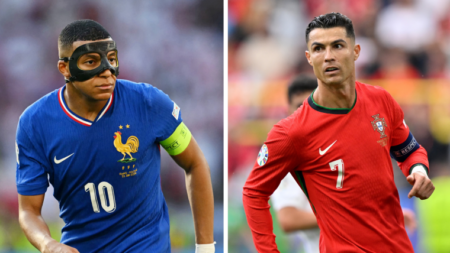There are 710 days until the United States men’s national team opens the 2026 FIFA World Cup at SoFi Stadium in Los Angeles. To say that’s a lifetime in soccer would be hyperbolic, but so much can occur in such a long period of time. Maybe by then the USMNT will have scored another goal.
Monday night, they played 90 impotent minutes against Uruguay in Kansas City, their decisive third game in the Copa America, ostensibly a major tournament but run more like a middle school pickup affair.
The U.S. began the night officially needing a draw to advance, but after a while a victory was required, then a draw, and finally they were desperate for two goals in the final 20 minutes to secure the win that would advance them to the Copa quarterfinals as one of the top two finishers in Group C. They got none. They never got all that close. They competed ferociously from the start, but not efficiently or effectively Their expected goals rating for the game, according to FotMob.com, was .56. Honestly, half a goal would have been better than this 1-0 defeat.
MORE: Will USA fire Gregg Berhalter after Copa America disaster? USMNT plays to uninspiring result ahead of 2026 World Cup
It will be a significant challenge now for U.S. Soccer sporting director Matt Crocker to defend his decision to rehire Gregg Berhalter as the national team coach (should he so desire) and to retain him as those 710 days turn to 610 and 510 and so on.
Berhalter was not a popular choice among the fan base either of the two times he was installed in the position. The first time around, he proved he was the right man by owning the teams fielded by the coach widely was considered to be the runner-up in that search, Tata Martino. Since Berhalter’s return in the fall of 2023, however, the results have been so much less convincing.
Berhalter declared he still is the right coach for the USMNT. He insisted they have improved since he returned: from a defensive standpoint, statistically creating goal chances, ball movement. “You want to keep moving the team forward, and I feel like we have,” he told reporters. “In my opinion, it’s not something you say, ‘OK, this program’s doomed.’ It’s not the case at all. It was a poor performance. We didn’t get the result that we expected, and we need to get better.”
There will be another CONCACAF Nations League in the spring and a Gold Cup next summer, but those competitions do not contain the degree of intensity or pressure present in the qualifying process of a World Cup. As co-host, the Americans are already in the 2026 field. So this Copa America was to be the USMNT’s last great chance for high-level competition in a significant championship in advance of the world coming to play here two years hence.
It surely did not turn out that way.
MORE: USA eliminated from Copa America after controversial defeat to Uruguay
The tournament itself has been shambolic, from the inability to establish a coherent television angle at Kansas City’s Arrowhead Stadium to the assignment of a referee with almost no international tournament experience to this massive group game. “Amateur hour,” left back Jedi Robinson called Monday night’s officiating in an interview with Fox Sports. That included rookie ref Kevin Ortega allowing Uruguay to play a quick free kick while he showed a yellow card to defender Chris Richards and the decision by the video assistant referee to allow Uruguay’s (obviously offside) second-half goal to stand.
MORE: How VAR confirmed Matias Olivera opener to doom USMNT at Copa America
But the Americans’ performance in Copa America also was deficient from the moment winger Tim Weah chose to retaliate against a Panama opponent in the second game and earn a red-card ejection with more than 70 minutes of soccer still to play.
Instead of being able to operate with zeal against an opponent they’ve regularly beaten, the USMNT were fighting merely to exist.
It was easy to see from Berhalter’s sideline demeanor that survival mattered above all, from the obvious concern on his face to the apparent overemphasis on what was occurring in the simultaneous Panama-Bolivia game. The U.S. needed to match Panama’s performance on this night in order to advance, and when the Americans were still stuck in a scoreless draw but Bolivia scored to even their game at 1-1, Berhalter was aware and communicating about this.
This was a significant error. Unless there was a massive differential indicating a result had been assured, the Panama-Bolivia score would only be relevant as each game approached its conclusion.
“When you’re in tournament football, there’s very little that separates success from failure,” Berhalter told reporters. “It’s one action, it’s one decision from a referee, and you could be in trouble. And for us, it’s having that understanding – that every time you step on the field, it has an impact. I think we’re getting there. But we’re not always there. And that’s something we can improve.”
MORE: USMNT fans frustrated by camera angle during Uruguay match
Which isn’t really good enough. One of the most important reasons Berhalter returned to his position as head coach after the 2022 World Cup was the support of the players for the culture he’d built inside the program. But since Berhalter was rehired, the U.S. had to play down a man in the second game of a Nations League series against Trinidad & Tobago because of an astonishingly juvenile tantrum by right back Sergino Dest, and then again last week in a much more dire circumstance against Panama.
If player support doesn’t manifest itself in perpetual effort and attention to detail, but merely in private conversations, press availabilities and social media posts, how great is its value?
“I see no issue with the direction we’re heading,” goalkeeper Matt Turner told Fox. “When you have a fight like that on the pitch every single game that we were in this tournament, speaks volume to how the manager prepares us. And to be honest, we’ve been in position to win in every single game that we’ve played.
“We can’t look anywhere to blame but ourselves, us players.”
Whomever first called this group of American players a “golden generation” surely is embarrassed enough never to reveal their identity. Starting with forward Christian Pulisic, it is a group of players performing (or sometimes not) in better leagues and at better clubs than was true of most past USMNT squads. They have not established a lethal striker, though. They are not exceptional in central defense. They do not have a goalkeeper regularly starting for a major club.
It’s a better group than they showed in the past month, regardless. There will be few significant chances, now, for Berhalter (or whoever is in charge) to demonstrate the USMNT will be ready for what arrives July 12, 2026.
Read the full article here














